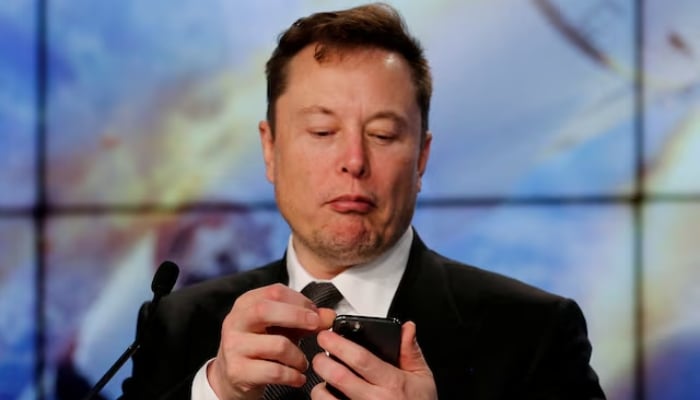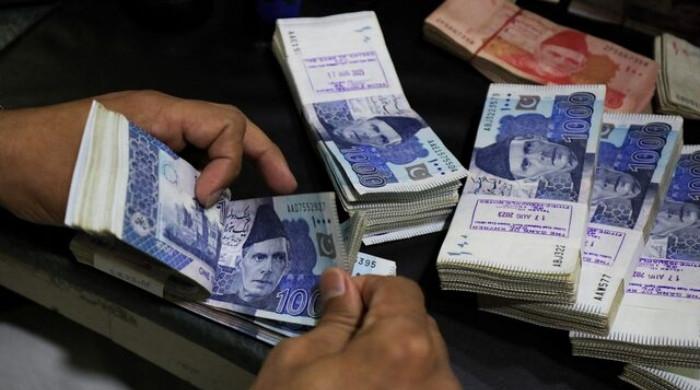Musk's dangerous game
Musk must prove that hate-mongers are condemnable everywhere whether they are in the US or anywhere else
January 09, 2025

American tech billionaire Elon Musk’s recent tweets and statements seemingly expressing support for far-right forces in Europe have disappointed many across the world. Critics fear that such tweets and statements by a man with more than 211 million followers on X (formerly Twitter) could foment disharmony between communities in several parts of the world besides creating an impression that the billionaire is meddling with the local politics of European countries.
Musk’s detractors believe that such tweets paddle the propaganda of ultra-nationalists who are trying to drive a wedge between different communities living on either side of the Atlantic. Musk has not only expressed his support for British far-right activist Tommy Robinson but has also issued tweets considered sympathetic to far-right political parties in Germany.
He has been criticising different political parties for some time. His recent target was British Prime Minister Keir Starmer whom he accused of being “deeply complicit in the mass rapes in exchange for votes”. Musk also lambasted other British government officials.
According to the BBC, the row between Musk and Starmer centres around a series of high-profile cases where groups of men — mainly of Pakistani descent — were convicted of sexually abusing and raping predominantly young white girls around the UK.
As per the BBC: “In 2012, The Times newspaper investigated Rotherham grooming gangs, which led to a major inquiry. At least 1,400 children were subjected to appalling sexual exploitation in Rotherham between 1997 and 2013, according to a 2014 report, written by Prof Alexis Jay. The report made headlines in the UK and around the world and led to major debates in parliament. Similar scandals also occurred in other towns, including Oldham, Oxford, Rochdale and Telford, leading to a national inquiry into child sexual abuse, which was also led by Prof Jay. The cases sparked investigations into alleged failures to properly address the crimes and support victims.”
Starmer came up with a strong reaction on Monday, condemning Musk’s increasingly erratic attacks on the government, suggesting his “lies and misinformation” on grooming gangs were amplifying the “poison” of the far right. Musk published a series of posts on X suggesting Starmer failed to deal with the grooming gang scandal while head of the Crown Prosecution Service (CPS) between 2008 and 2013.
The British prime minister not only criticised Musk but also Conservative politicians, accusing them of “jumping on the bandwagon” by calling for a national inquiry into the scandal when they failed to implement any of the recommendations of a major report while in power. He accused them of being more interested in themselves than supporting victims.
British government ministers promised on Monday to introduce a key demand of Prof Alexis Jay’s 2022 child sexual abuse inquiry so that professionals who work with children would face sanction if they failed to report claims of sexual abuse under a law to be introduced this year. Starmer said the debate on the issue had crossed a line with threats against MPs including the safeguarding minister, Jess Phillips, whom Musk called a “rape genocide apologist” and said should be jailed.
Many critics described Musk’s criticism of Starmer as unjustified. For instance, Guardian’s columnist Gaby Hinsliff pointed out that under Starmer’s leadership as director of public prosecutions, a landmark prosecution in Rochdale paved the way for grooming trials around the country, and he introduced reforms making it easier to bring complex sex offence cases.
Many of Musk’s critics believe that the tech billionaire should be careful in taking a position that seems to be supporting the ultra-nationalist forces. For instance, the American business tycoon just last month opined that only the AfD can save Germany. The party is considered a rabidly anti-immigrant entity and some of its leaders have been accused of making antisemitic, anti-Muslim and anti-democratic statements. For instance, Bjorn Hocke, leader of the AfD party in the state of Thuringia, has twice been fined by a German court for using a banned Nazi slogan. Alexander Gauland, an AfD co-founder, said in a 2018 speech to the AfD youth wing, “Hitler and the Nazis are just a speck of bird poop in more than 1,000 years of successful German history.”
In its 2017 election manifesto, AfD asserted that the presence of Muslims in Germany was a threat to the country: “Islam does not belong in Germany. The AfD sees the spread of Islam and the presence of over 5 million Muslims, whose numbers are constantly growing, as a great danger to our state, our society and our system of values.”
It is perhaps because of this political rhetoric of the party that the German domestic intelligence agency listed AfD as an officially suspected extremist organisation and classified its youth wing, ‘Young Alternative’, as extremist in April 2023. German state authorities in Saxony, Saxony-Anhalt, and Thuringia have gone a step further and classified the AfD party as a whole as extremist.
Musk is being slammed in the UK and Germany and has also been criticised by French President Emmanuel Macron, with whom he enjoys good ties. Without naming Musk, Macron said on Monday, “Ten years ago, who could have imagined it if we had been told that the owner of one of the largest social networks in the world would support a new international reactionary movement and intervene directly in elections, including in Germany.”
Unlike Macron, Norwegian Prime Minister Jonas Gahr Store was more direct in his attack on the US businessman, saying he found it “worrying” that Musk, “a man with enormous access to social media” would be so “directly involved” in the politics of other nations.
Critics assert that the alleged support of Musk for reactionaries of Europe indicates that he does not know how European history badly suffered because of the politics of hate-mongering peddled by far-right forces in the continent. No European with a modicum of political consciousness would countenance any praise for such fanatical groups because the residents of this continent know very well the decimation of more than 70 million people during the two terrible mass slaughters which appalled pacifists across the world.
The second carnage that visited the continent from 1939 to 1945 had partly been fuelled by the politics of hate fomented by the Nazi party. Many rightly fear that Musk with his millions of followers has the potential to create a radical political narrative and if such a narrative is influenced by the vitriolic ideology of the far-right then it is bound to be catastrophic not only for Europe but the world as well.
Analysts feel that Musk’s attitude might force European countries to revisit their social media policies aimed at granting maximum freedom of speech. Some might go to the extent of reining in X. Any initiative to control the social media platform would encourage authoritarian leaders to come up with more curbs on their people. It is encouraging to see that Musk defended Indians against the recent xenophobic attacks meant to target Indian skilled workers.
But if the billionaire lends support to other xenophobic parties in Europe and elsewhere then people would be forced to conclude that the support to Indian skilled workers is just meant to protect the business interests of the richest man. So, Musk must prove that hate-mongers are condemnable everywhere whether they are in the US or anywhere else.
The writer is a freelance journalist who can be reached at: [email protected]
Disclaimer: The viewpoints expressed in this piece are the writer's own and don't necessarily reflect Geo.tv's editorial policy.
Originally published in The News











